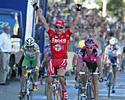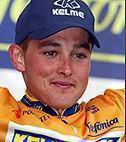
Recently on Cyclingnews.com |
Vuelta News for September 18, 2002Edited by Jeff Jones Rest day wrap upBy Jeff Jones After 10 days of tough competition in some fairly desolate countryside in southern Spain, the riders of the 57th Vuelta España were able to enjoy a day of rest. The Vuelta had to move itself some 400 km north from Cordoba to Alcobendas (near Madrid), which was made easier by the AVE, Spain's version of the TGV high speed train. That means the riders could have enough time for some training today, as is the norm on rest days of grand tours. What has passedThe first 10 days of the Vuelta have seen some aggressive racing mixed in with the usual sprinters stages, which are typically weighted to the first half of the race. After ONCE-Eroski opened with a stage win in the team time trial, many were impressed with their strength and incredible depth. Joseba Beloki took the leader's jersey, and ONCE were determined to keep it.
However, Kelme and US Postal Service also acquitted themselves well in the opening stage, losing only 15 seconds to the ONCE machine. What was worrying for Kelme was Santiago Botero's performance in the TTT. Normally one of the best against the clock, Botero was struggling to hold wheels in that stage, and things did not improve.
Stage 2 from Valencia to Alcoy was not quite your regulation sprint stage, finishing with a Cat. 3 climb and twisty descent to mess up the sprinters trains. The panic was heightened when GC threat Oscar Sevilla got away with a few others on the descent, only to be caught by a concerted effort with a few km to go. The sprint was uphill, and most of the sprinters save for Erik Zabel were left behind, as Danilo Di Luca (Saeco) took an impressive win, his first in the Vuelta.
Stage 3 that finished in Murcia was more suited to the sprinters, and this time they did not disappoint. One team in particular - Acqua e Sapone - took charge in the late kilometres to set up a perfect lead out for their man Mario Cipollini. Cipo did not disappoint, charging home in front of Alessandro Petacchi and Erik Zabel for his first ever Vuelta stage win. No changes to the GC, with Beloki/ONCE still very much on top.
It was more of the same in stage 4 from Aguilas to Roquetas De Mar, with perhaps an even better performance from Cipollini. The early breakaway Dario Gadeo was chased down with 13 km to go, and the full Acqua e Sapone zebra train got into gear. Cipollini had more than a bike length to spare as he crossed the line in Roquetas De Mar, arms raised. Petacchi was again second with all rounder Gerrit Glomser (Saeco) nipping in for third.
The first mountain top finish greeted the riders in stage 5, ending with the 37 km climb to Sierra Nevada. A long haul that gradually cut the peloton to pieces, with a group of 12 riders eventually getting clear of Beloki and co. to fight it out for the stage win. Included amongst these was future leader Oscar Sevilla, who put nearly a minute into Beloki, Heras, Simoni, Casagrande and Casero at the end of the climb. The day's winner was Cofidis' Guido Trentin, who continued the Italian success at the Vuelta. Beloki's teammate Mikel Zarrabeitia was also in the group, and picked up the leader's jersey.
Stage 6 was also a mountain top finish, with the Vuelta visiting La Pandera for the first time. A shorter and steeper climb than Sierra Nevada, La Pandera provided the opportunity for the pure climbers to shine. Roberto Heras extracted some revenge on Sevilla for the previous day, but only 17 seconds worth as he was first to the top of the climb in front of Gilberto Simoni, Oscar Sevilla and Iban Mayo. Sevilla took the gold jersey as Zarrabeitia finished 27th at 2'35.
It was back to the flats again on stage 7 from Jaen to Malaga, and after a very hot day with another early breakaway, the sprinters teams took control and set things up for a mass finish. Acqua e Sapone only got it together with 2 km to go, but it was enough for Cipollini to claim his third stage win and his last in the Vuelta, bowing out the next day in order to rest and prepare for the World Championships.
Stage 8 from Málaga to Ubrique was a tough one, undulating all day with a Cat. 1 climb at 23 km to go to really split the peloton. Kelme rode tempo in front, helped by Euskaltel-Euskadi who wanted to bring back a breakaway containing Igor Gonzalez de Galdeano. They did so on the climb and a 30 rider group crossed the summit, with Gilberto Simoni picking up the mountain points to move himself into the lead in that classification. On the descent, Luis Perez (Team Coast) attacked and looked to have the stage won, but he was chased and caught by Kelme's Aitor Gonzalez with 200m to go, and lost the stage.
Stage 9 from Córdoba to Córdoba (130.2 km) was mentally and physically very tough. A lightning fast start saw the peloton split into two, with several favourites including Francesco Mancebo, Danilo Di Luca and Oscar Freire being left behind. They never saw the front again, and both Freire and Mancebo abandoned. The stage was won by Pablo Lastras (iBanesto.com) who attacked on the last descent - successfully this time - to win in front of the luckless Luis Perez who had chased him.
Stage 10 was the race of truth. An individual time trial of 36.5 kilometres over a technical and soggy course in Cordoba. No rider escaped the rain, although the last ones to start had the best conditions. Times were slower than usual but the big winners of the day were Kelme's Aitor Gonzalez, who won his second stage, and Oscar Sevilla, who finished second and kept his leader's jersey. Iban Mayo, Joseba Beloki and Roberto Heras also rode well to stay in contention, while others such as Simoni and Casero lost too much valuable time. The leaderboard at the end of the first 10 days has Sevilla on top in a cumulative time of 33.19.05. He is followed by Aitor Gonzalez at 1 second, with Heras third at 1'42 and Mayo and Beloki in fourth at 2'04. What lies aheadTomorrow's 11th stage starts in Alcobendas, and will take the riders 166 km to Collado Villalba via two Cat. 3 and two Cat. 1 mountains. The last of these comes at 25 km to go and will surely produce a selection. Three relatively flat stages follow this, giving the sprinters left in the race an opportunity to score before the mountains hit again. On Sunday, a fearsome stage awaits: 176 km from Gijón to Angliru, the notorious climb that was first introduced in 1999, and caused a great deal of suffering. After missing out last year, the Angliru is back, and it's preceded by two very tough Cat. 1 climbs: Puerto Marabio (km 80, avg. 7.1%) and Alto del Cordal (km 155, avg. 9%). The Angliru itself is 12.9 km long at a leg snapping average of 9.6%, with a savage 17-23% section with 3 km to the top. It's going to make for some very hard racing, and the Vuelta could change its complexion on this day. After that, the riders will have another rest day before the final six stages, finishing in Madrid on Sunday, September 29. Join us tomorrow at 14:45 CEST/05:45 PDT/08:45 EDT/22:45 Aust. EST for live coverage of Stage 11.
(All rights reserved/Copyright Knapp Communications Pty Limited 2002) |
|











